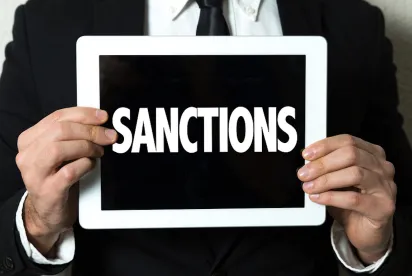On May 8, 2022, the U.S. Department of the Treasury’s Office of Foreign Assets Control (OFAC) announced new sanctions against Russia, including a ban on the provision of certain categories of services to Russia. The latest OFAC sanctions package was imposed in conjunction with new export controls on industrial goods implemented by the U.S. Department of Commerce’s Bureau of Industry and Security (BIS).
U.S. Imposes Additional Targeted Sanctions on Russian Companies, Individuals
Building on previous rounds of targeted sanctions, OFAC issued a number of designations aimed at Russia’s financial, defense, and state-run communications sectors. OFAC added eight current and past PJSC Sberbank executives and 27 Gazprombank executives to the Specially Designated Nationals (SDN) List. Additionally, OFAC added Russian state-owned bank, JSC Moscow Industrial Bank (including 10 of its subsidiaries), a defense entity, limited liability company Promtekhnologiya (a rifle producer), and three Russian-state-owned news networks, JSC Channel One Russia, Television Station Russia-1, and JSC NTV Broadcasting Company, to the SDN List.
Executive Order 14071 Determination
The new sanctions package imposes a new prohibition on the export of certain services to Russia pursuant to Executive Order 14071. Effective June 7, 2022 (and subject to a short-term wind-down authorization, General License 34, described below), U.S. persons are prohibited from engaging in or facilitating the export, reexport, sale, or supply, whether direct or indirect, of management consulting, trust and corporate formation, and accounting services to any person in Russia. The new services prohibition carves out the following two exceptions: “(1) any service to an entity located in the Russian Federation that is owned or controlled, directly or indirectly, by a [U.S. person],” or “(2) any service in connection with the wind down or divestiture of an entity located in the Russian Federation that is not owned or controlled, directly or indirectly, by a Russian person.” These measures follow the UK’s ban on UK persons or entities exporting certain professional services to Russia. See May 6 GT Alert.
Potential Secondary Sanctions Exposure for Consulting Services Providers
Apart from these primary sanctions prohibitions on the provision of certain services to Russia, OFAC has further published a determination pursuant to Executive Order 14024 authorizing the imposition of secondary sanctions on non-U.S. persons. Effective immediately, any person designated by the secretary of the treasury in consultation with the secretary of state determined to be operating or has operated in the accounting, trust, and corporate formation services, and management consulting sectors of the Russian economy will be targeted by U.S. sanctions. At this time the determination does not designate any individuals or entities, but it allows for the imposition of sanctions on any individual or entity determined to operate or have operated in any of the abovementioned sectors. Unlike primary sanctions prohibitions, secondary sanctions expose individuals and companies with no nexus to the United States to potential OFAC sanctions measures, signaling the U.S. government’s determination to dissuade even non-U.S. persons from doing business with Russia.
Issuance of Russia-Related General Licenses
In conjunction with the sanctions measures described above, OFAC issued a number of Russia-related general licenses permitting certain types of limited activities by U.S. persons in or with covered regions or with sanctioned entities or individuals, including temporarily permitting certain activities to divest, transfer, or wind down impacted holdings.
-
General License No. 25A authorizes activities related to telecommunications and certain internet-based communications.
-
General License No. 33 authorizes the wind-down of operations or existing contracts (that were in effect prior to May 8, 2022) involving certain blocked entities through June 7, 2022 (12:01 a.m. EST).
-
General License No. 34 authorizes the wind-down of accounting, trust and corporate formation, and management consulting services through July 7, 2022 (12:01 a.m. EST).
-
General License No. 35 authorizes transactions involving credit rating and auditing services through Aug. 20, 2022 (12:01 a.m. EST).
Expansion of Sanctions Against Russian Industry Sectors Under the EAR
Concurrent with the announcement of new OFAC sanctions, BIS issued a final rule expanding export controls on equipment and other items widely used across various Russian industries. The final rule imposes an export license requirement on exports, reexports, and transfers to Russia of several hundred categories of commodities, including industrial engines, wood products, boilers, motors, fans, ventilation equipment, bulldozers, and various other items with industrial and commercial uses. All commodities subject to the new licensing requirement are classified as EAR99 items, which typically do not require a license for export or reexport except to sanctioned destinations. The new measure signals the severity of the U.S. export controls regime now in place with respect to Russia.
In total, the new export licensing requirement covers 205 Harmonized Tariff Schedule (HTS) codes at the six-digit level and 478 corresponding 10-digit Schedule B numbers. These items were added to Supplement No. 4 to Part 746 of the Export Administration Regulations. Applications for exports or reexports of these commodities will be subject to a policy of denial unless the proposed transactions are essential for health and safety reasons or are necessary to meet humanitarian needs.
The export controls expansion will place even further restrictions on Russia’s access to U.S. technologies and commodities. The targeted controls are largely directed at Russia’s industrial goods sector and are designed to further limit Russia’s access to items necessary to support its military operations.
Key Takeaways
Given the dynamic security and legal situation in the region, all companies and organizations engaged in activities involving Russia, Ukraine, and Belarus should continuously assess the nature and type of activities, nationalities of personnel involved in those activities, and steps necessary to wind down such activities if they cannot permissibly continue under the current sanctions measures. And with the imposition of U.S. secondary sanctions authorities, even non-U.S. individuals and companies doing business in Russia should evaluate their exposure to potential U.S. sanctions measures.
Additionally, in light of U.S. export controls that have expanded in recent months, companies assessing their activities in the region may also consider what items (goods, software, and technology) are exported, reexported, or retransferred to or in Russia, and take internal compliance measures to prevent unauthorized and even inadvertent exports of controlled items to Russia.
Companies should classify any commodities they continue to export or reexport to Russia under the U.S. export controls regulations to determine whether the measures trigger new export licensing requirements. Exporters may no longer assume that low-level or commercially available commodities can be exported to Russia without a license.
Given the fluid situation of the Russia-Ukraine conflict, companies and organizations should continue to closely monitor communications/guidance from BIS, the Department of the Treasury’s Office of Foreign Assets Control, and the White House. Should the conflict continue to escalate, President Biden and other leaders have indicated a willingness to escalate sanctions in response.





 />i
/>i

